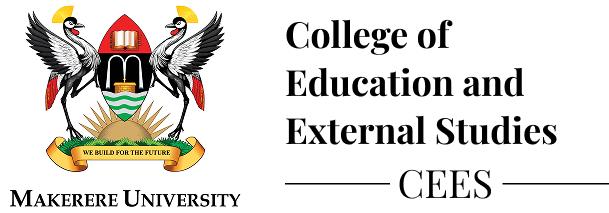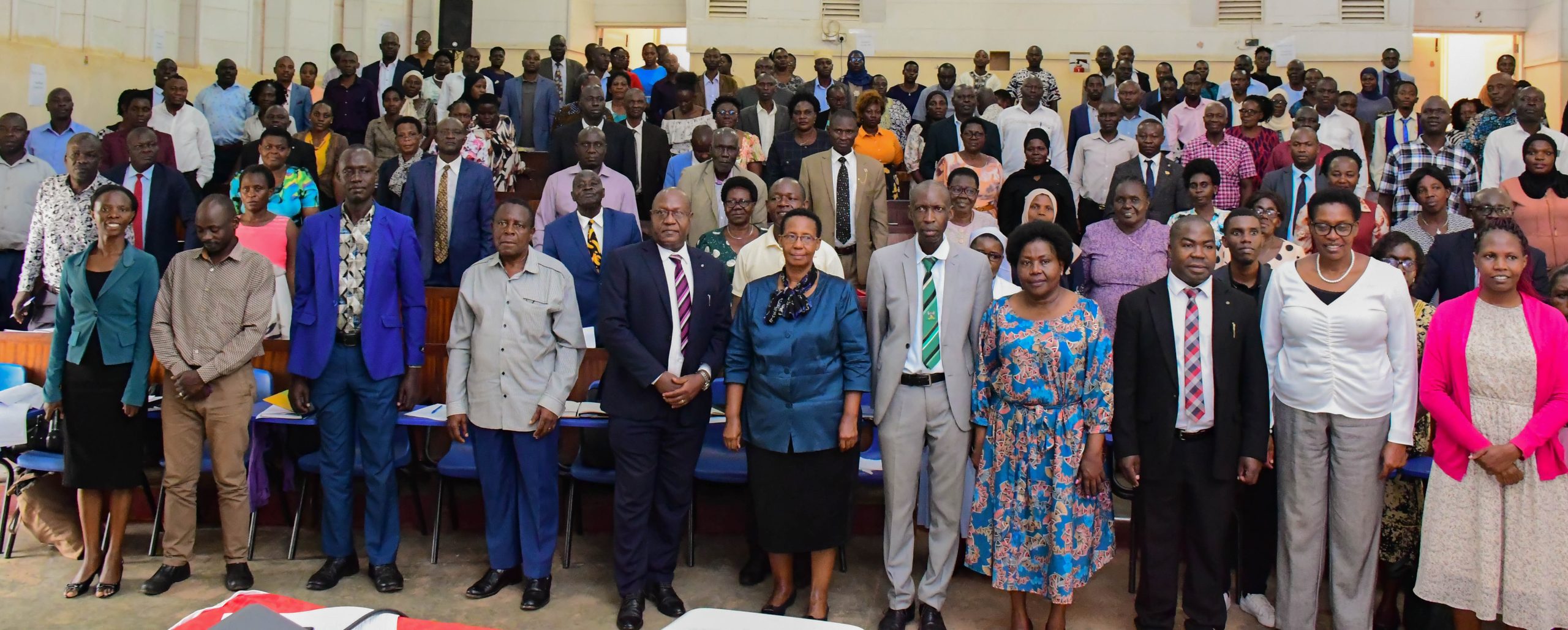September 19, 2025: Over 200 stakeholders in the education sector have convened at Makerere University to participate in the Early Childhood Teacher Education Policy awareness workshop organised by the Ministry of Education and Sports (MoES) and the College of Education and External Studies (CEES).
Informed by the growing demand for Early childhood care education services in Uganda, the workshop brings on board, policymakers, teacher educators, school proprietors, directors, and representatives from training institutions across Uganda, to discuss strategies for improving the quality and accessibility of early childhood education.
The workshop seeks to strengthen partnerships between government, training institutions, and other stakeholders, to address gaps in teacher education, and come up with recommendations to professionalise Uganda’s early childhood care workforce.
Early Childhood Education: A National Priority
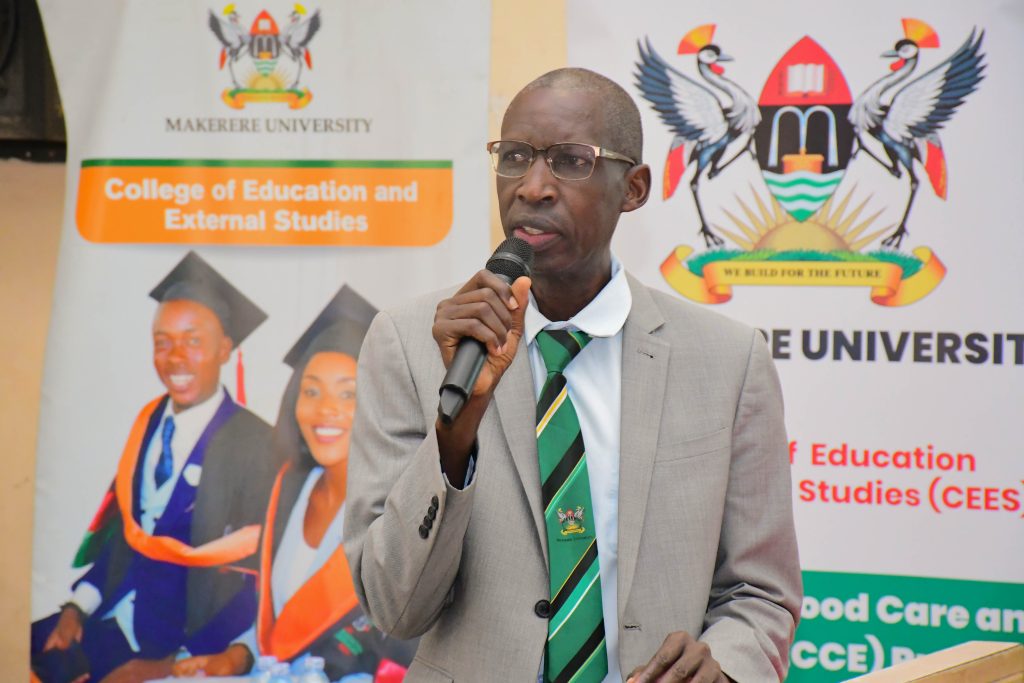
Addressing the participants, Professor Anthony Mugagga, the Principal of the College of Education and External Studies (CEES) at Makerere University, emphasized that early childhood education is not only a sectoral priority, but a national necessity. “Early childhood education is key in Uganda; it is part of us,” he said, highlighting the pivotal role of early childhood care and education (ECCE) in shaping Uganda’s future human capital.
The Principal of CEES reaffirmed Makerere University’s commitment to supporting the sector through teacher training, research, and capacity-building initiatives. Prof. Mugagga disclosed the rising demand for Early Childhood Education programs, which has far exceeded initial expectations.
“The College of Education and External Studies at Makerere University, initially targeted diploma holders for its newly launched Bachelor of Early Childhood Education program. However, applicants with Advanced Level (A-level) qualifications demonstrated overwhelming interest. The first advertisement attracted 500 applicants, but only 110 could be admitted. A second advertisement received 1,000 applications, and only 120 students could be admitted. The Master’s in Early Childhood Education program also attracted 100 applicants, and only 10 students were admitted,” he explained.
“To meet this demand, Makerere University is appealing for funding to establish a dedicated Early Childhood Education centre, which will provide additional infrastructure and staff to train more educators,” Prof. Mugagga said.
Prof. Mugagga also announced that the College is currently offering a research-based PhD in Early Childhood Care and Education (by research), and the University Council has approved plans to introduce a taught PhD program in the upcoming academic year, broadening opportunities for advanced professional development in the sector.
Teacher Training: The Foundation of Quality Education
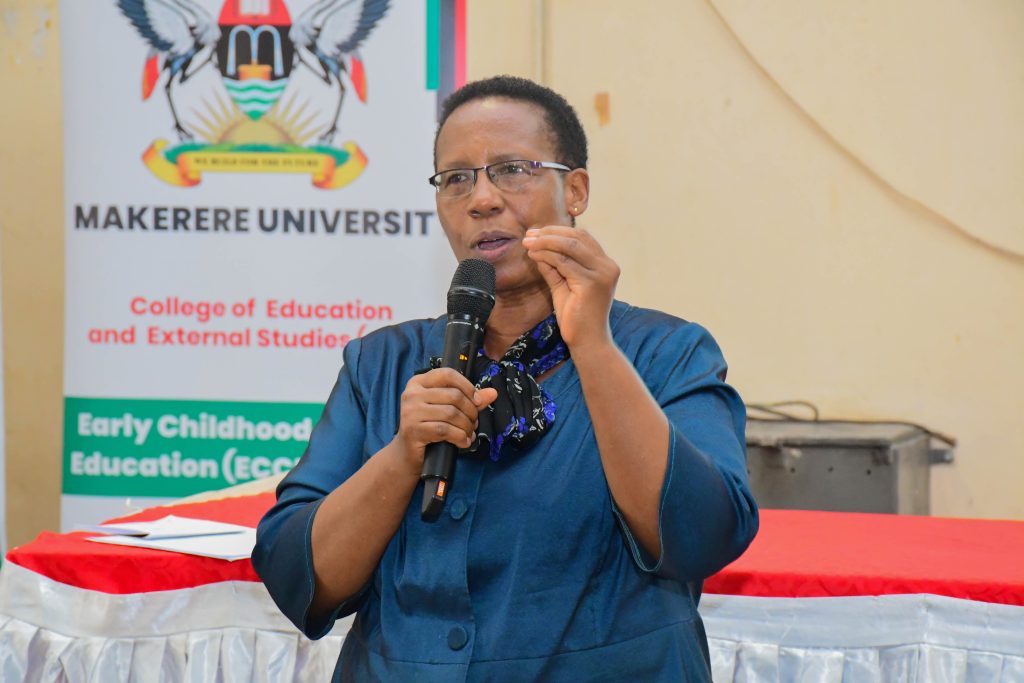
Dr. Annet Mugisha Kajura, Acting Commissioner for Teacher Education and Training at MoES, underscored the importance of teacher preparation as the foundation of a robust education system.
She tasked planners, policy makers, leaders, parents and teachers to uphold the fact that nursery education is the pivot of the education system.
Using the metaphor of a forest, she explained: “Just as a forest cannot thrive if young trees are removed, the education system cannot progress without well-trained and motivated teachers.” She added, “A strong building cannot stand without a solid foundation; in education, teachers are that foundation.”
She stressed the need to mainstream early childhood education in the education sector, and to dedicate resources to the provision of high-quality early childhood education including training of nursery teachers.
Dr. Mugisha Kajura outlined the objectives of the workshop, which included strengthening partnerships between the Ministry and training institutions; enhancing coordination and cooperation mechanisms for better outcomes; raising awareness on early childhood education standards and policies; identifying gaps in teacher training; and developing strategies for accreditation, certification, and online registration of pre-primary teachers.
Dr. Mugisha Kajura highlighted several key challenges affecting teacher training institutions, including unregulated programs, insufficiently qualified staff, and a lack of professional ethics. She called upon institutions to focus on quality, adhere to approved training frameworks, and foster teachers who are ethical, accountable, and motivated by more than financial gain.
Policy-Practice Gaps in Early Childhood Education
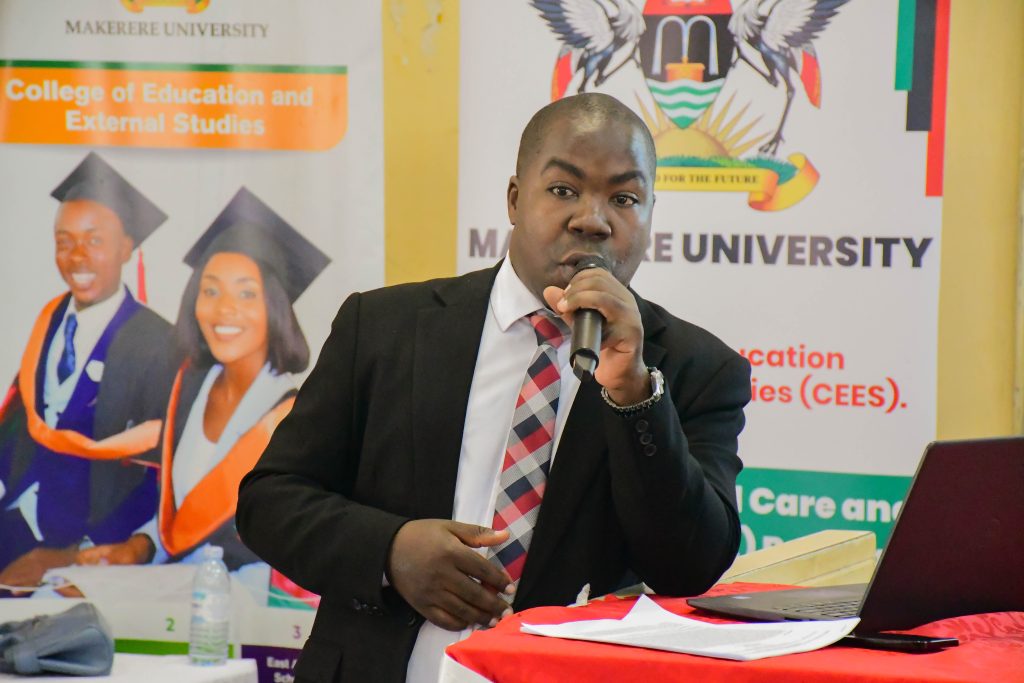
Dr. David Kabugo, Deputy Director at the Makerere Institute of Teacher Education and Research (MITER), presented paper titled “Repositioning Early Childhood Education Teacher Training and Development in Uganda.”
He noted persistent gaps between policy intentions and practice in the sector. Dr. Kabugo highlighted four critical areas of focus: training, certification, registration, and licensing of ECE teachers and caregivers.
“There are contradictions within the current ECD caregiver and teacher training framework and the National Teacher Policy, which create dead ends in professional pathways. Fragmented governance, unclear mandates, and low remuneration further hinder the effective professionalisation of the sector,” he explained.
One of the key challenges Dr Kabugo raised was the limited human resource capacity in Uganda’s ECE sector. “The number of highly qualified educators is extremely low: only a handful of professors specialise in ECE (notably Professors Ogaka and Eje), very few associate professors, about 10–15 PhDs nationwide, and a limited number of qualified teachers with a Masters’ degree programme in ECE. While the number of bachelors and certificate-level educators is growing, the distribution forms a triangular pyramid, with higher levels of expertise scarce and concentrated in select institutions.”
He continued, “This pyramid of competencies negatively impacts the quality and sustainability of early childhood education. To professionalise the sector, we need structured career pathways, enforcement of statutory requirements, and investment in teacher educators.”
Dr. Kabugo called on stakeholders to strengthen coordination, professional networks, and capacity-building initiatives to ensure high-quality ECE delivery nationwide.
Strengthening Standards, Infrastructure, and Digital Readiness
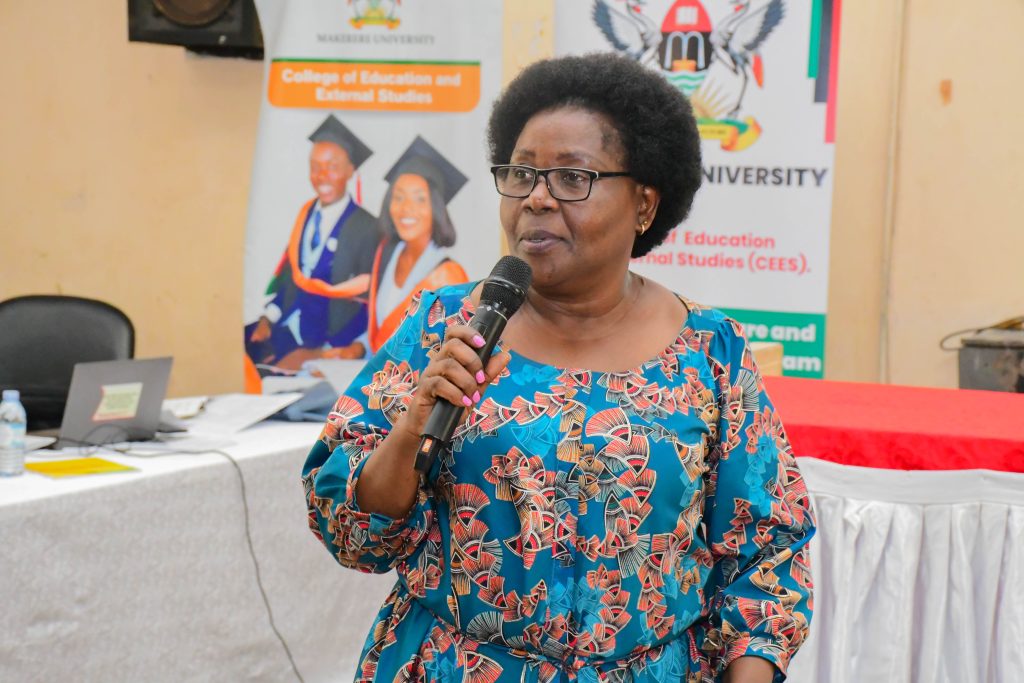
Elizabeth Kisakye Nsamba, Principal Education Officer in charge of ECD Teacher Education and Training at MoES, stressed the importance of regulatory compliance. “No institution is allowed to offer teacher training without government approval and affiliation,” she noted, emphasising that the Ministry is strengthening regulations to ensure only qualified and accredited institutions produce ECE teachers.
Kisakye Nsamba outlined requirements for teacher training colleges, including adequate infrastructure, functional demonstration schools for practical teaching, digital readiness, qualified staff, safe learning environments, and clear employment policies. “Institutions must maintain proper records, ensure transparency, and comply with Ministry guidelines to avoid challenges during inspections or registration processes,” she stated.
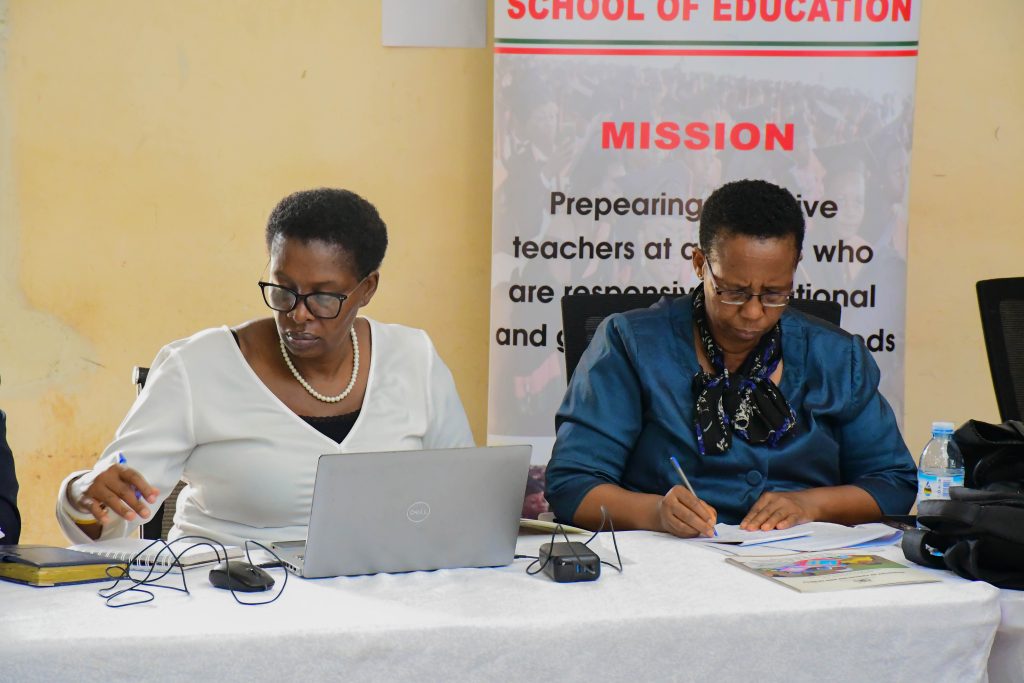
Fatuma Isabirye, TMIS Consultant at MoES, demonstrated the Ministry’s centralised Teacher Management and Information System (TMIS), which allows for online registration of pre-primary teachers.
“The system ensures transparency in teacher recruitment and deployment, verifies academic credentials, and issues unique registration certificates to officially recognised teachers,” she noted.
She called on institutions to submit accurate graduation lists promptly to facilitate smooth registration and prevent fraudulent entries.
Agreed Actions
Agreed actions include committing to building a support team and ensuring coordination and collaboration before taking any operational steps. Institutions will follow an approved training framework to maintain quality and standardise teacher education.
Collaboration, Research, and Professional Development
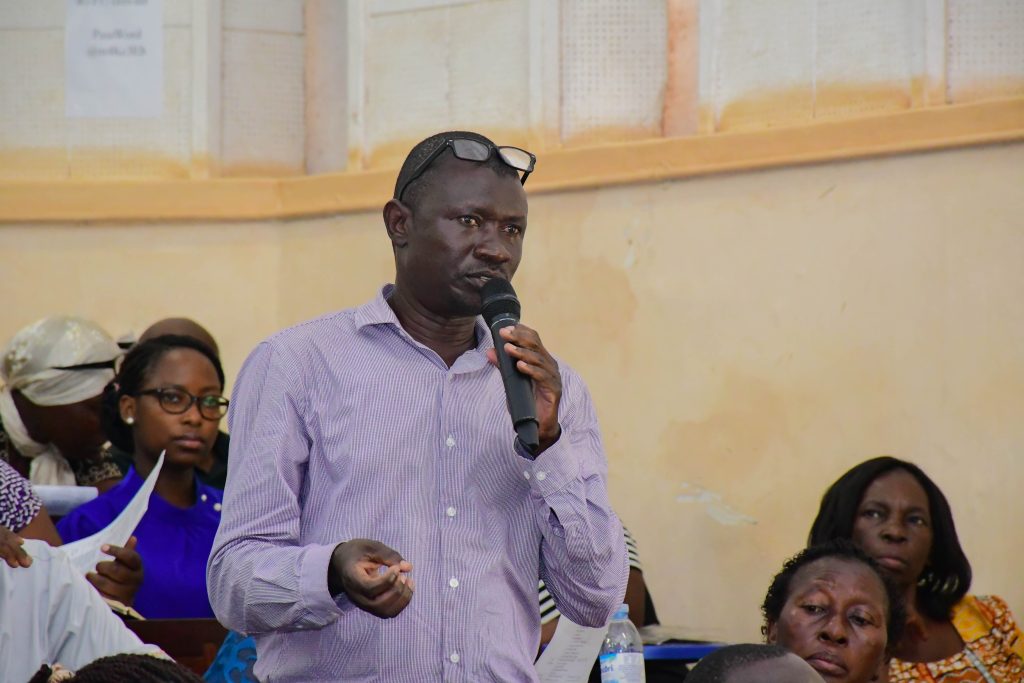
Vincent Muwonge, a Research Fellow at MITER, highlighted the role of collaboration in strengthening teacher education. He emphasised partnerships with universities, research institutions, and professional development programs to improve teaching quality, provide mentorship, and conduct educational research.
“Competency-based assessments, continuous professional growth, and ensuring that no teacher educator is left behind are crucial for Uganda’s education transformation,” he underscored.
Future Directions
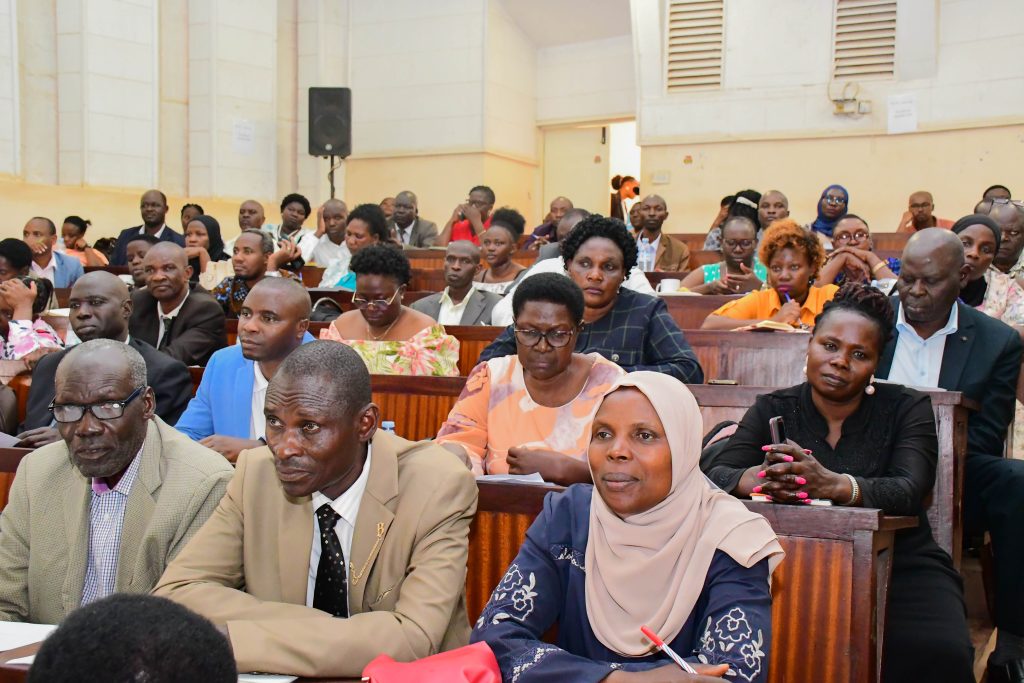
Hajat Safina Mutumba, Assistant Commissioner in charge of Pre-Primary Education at MoES, closed the workshop by highlighting the vital role of teachers in implementing curricula and policies.
She noted that government-aided primary schools often have attached nursery sections, which are mainly community-based. “The Education Policy Review Commission is considering proposals to expand nursery education in all government primary schools, stressing the need for a sufficient, well-trained workforce to meet this expansion.”
She presented the new policy developments, including the recently approved Pre-Primary Education Policy, which emphasises inclusive, quality, and affordable early childhood education, as well as capacity-building initiatives for teachers. “The national pre-primary curriculum is being finalised, minimum standards for pre-primary schools were approved earlier this year, and training manuals for School Management Committees have been developed,” she said.
She urged teachers to “embrace continuous professional development, stay updated on policy reforms, and prepare for the eventual implementation of universal nursery education in Uganda.”
A Unified Vision for Early Childhood Education
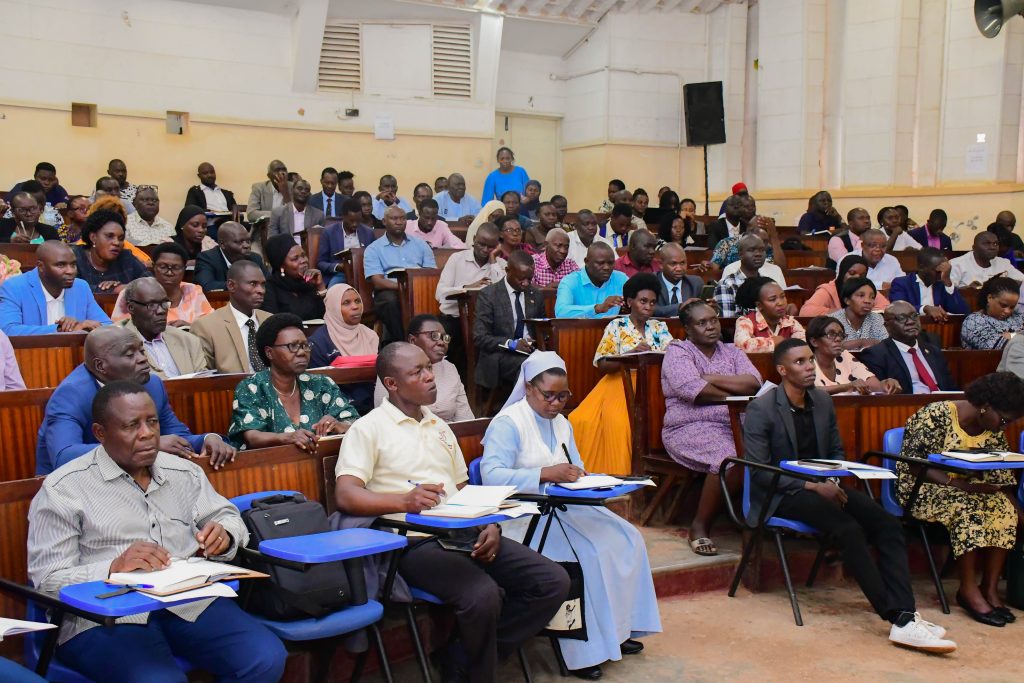
The workshop concluded with a strong consensus among participants: the quality of Uganda’s early childhood education system depends on highly trained, ethical, and competent teachers. Key priorities identified included expanding training capacity, strengthening human resources, improving governance and coordination, investing in infrastructure, and fully implementing statutory and regulatory frameworks.
The collaborative effort between Makerere University, MoES, and other stakeholders aims to produce a workforce of educators who will lay a solid foundation for Uganda’s human capital, ensuring that the next generation of learners receives quality education from the earliest stages.
